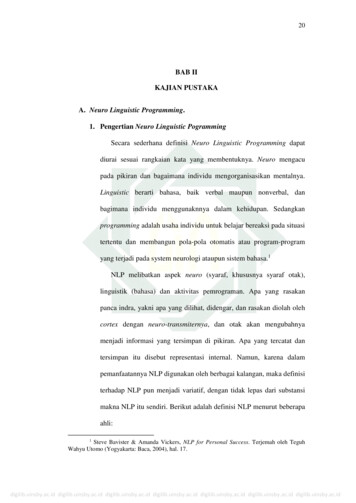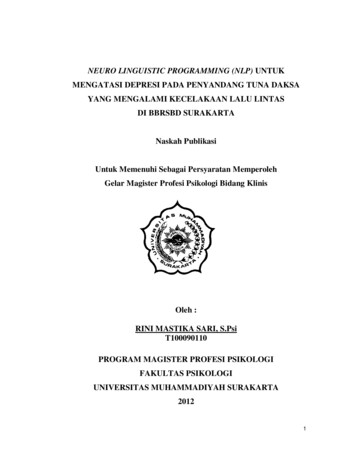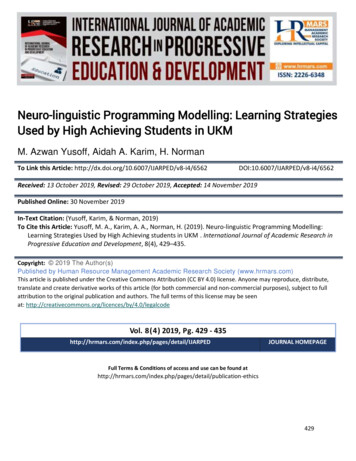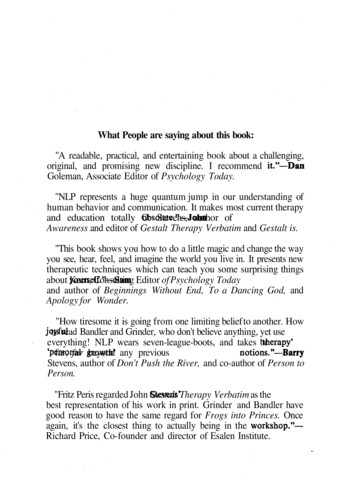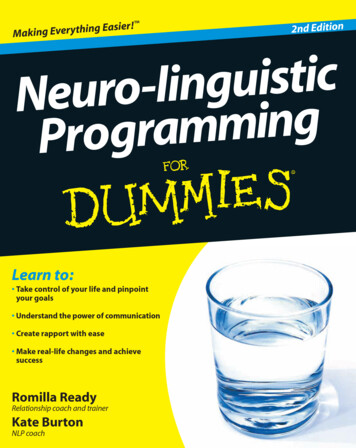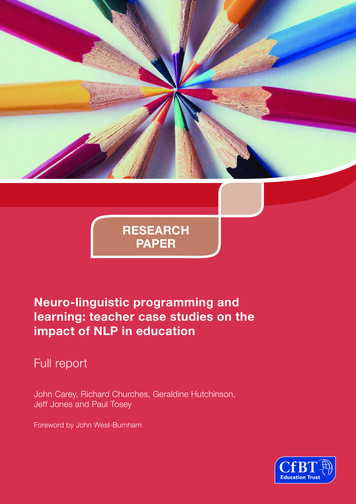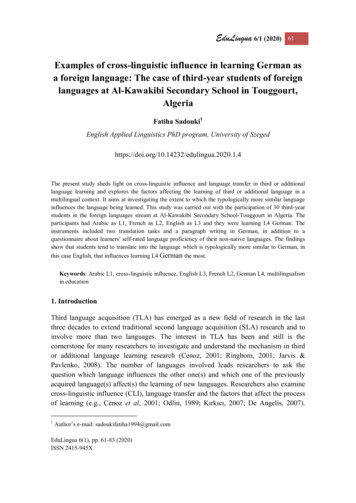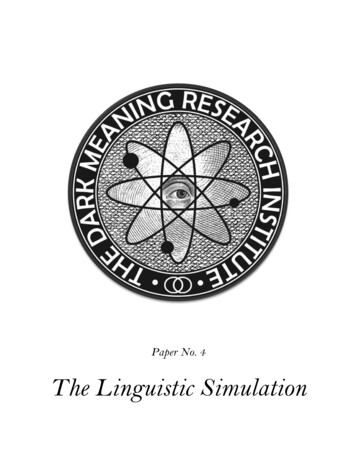
Transcription
Paper No. 4The Linguistic Simulation
THE DICTIONARYIS A SCI-FI NOVEL(AND WE’RE ALL TRAPPED INSIDE IT)The vast majority of people never learn thebig secrets about their existence due to thehuge amount of work done by theauthorities to keep certain things hidden(and then to make a secret of their secrecy).Fortunately, the DMRI has spent manyyears trying to undo that work with itsundercover research and is now in aposition to begin the Big Reveal.One of the biggest secrets you will everlearn is this: The universe we live in is asimulation.This may seem like an idea that can onlyexist in science fiction, but that doesn’tmean it isn’t true. This is because we live ina science fiction novel called The Dictionary.The technology used to create a realisticsimulation of the universe is calledlanguage, and it fools us into thinking weare experiencing reality when we use it.People have been trying to warn us aboutthe false nature of what we call “reality” forsome time now, but the deeper significanceof each message is not usually perceivedbecause we only have the eyes to read it(instead of the eyes to see it), which meanseverything is processed by the linguisticsystem and all references to that which isbeyond are deleted because they “do notcompute”.Figure 1: This is not the first time you haveseen this screen. If it is not yet obvious whatit means, it soon will be.We normally just accept the twodimensional meaning of a text1 and goabout our simulated business rather thantreating it as a Magic Eye passage throughwhich we can glimpse a deeper meaning.Translating into words the message that weneed to move beyond words is like asking aThis includes the universe itself because, asmany physicists have pointed out, it may existas a two-dimensional surface, with the rest ofthe information that we experience as threedimensions holographically written on it as a“description”.1
prison warden to describe the best escaperoute from their prison – whatever they say,it is guaranteed not to contain theinformation we need.If we want to gain access to thatinformation, we first have to realise that itexists beyond questions and answers. Everyquestion is really a semi-proposition loadedwith words, and it is used as a weapon withwhich to threaten nature into giving aninterrogator the “correct” answer.Language tricks us into thinking that if wecan ask a question, there must be ameaningful answer to it. The desire toknow the meaning of our existence isfundamental, but trying to find it usingonly words means we leave out everythingthat words cannot express. As the linguisticuncertainty principle states, the act ofmeasurement affects that which is beingmeasured, so the question ends up being aself-fulfilling prophecy, creating what itenquires after. Since questions are alwaysformulated in words, the answer to everyquestion, even the most profoundlyphilosophical ones about what existsbeyond the surface level of perception (i.e.beyond linguistic representations), will beconstructed from the same material that thesurface level is built from.If we ask the simulation of reality if it isreality, the answer will always be yes, butthat doesn’t mean it’s true. When weconsider that what is true is only trueaccording to the definition of what is true, itis obvious that we have been made tobelieve that words and reality are the samething by an absurd circular argument.All discussions take place in the dictionary,not in the world. Everyone “plays a part” inthe book of word meanings, but only aselect few play a part in writing it.All the world’s a stage.When you realise that the universe we liveinismadeoftwo-dimensionalrepresentations, it is possible to beginmanipulatingit.Thelinguisticmanipulation the DMRI is concerned withis not the sort that can be found in popularbooks on Neuro-Linguistic Programmingwhich promise to help people “influenceothers” and “get ahead in business” (becausesuch strategies amount to little more thanserving “I”, the character you play withinthe Matrix); instead, it is the sort ofmanoeuvring that allows you to find anescape route out of the linguistic simulationaltogether. Desiring something from thesurface level (such as money) rather thansomething beyond it (the meaning of moneyat the very least; or, even better, somethingthat completely transcends wealth andpoverty) guarantees that you will remaintrapped holographically on the surface ofthe page because both the problem(poverty) and the solution (wealth) arefound there. The most important leapmankind can make is over either/orthinking.If the question/answer dichotomy is thesame as the problem/solution dichotomy,the way to escape both could be to followthe question mark backwards through time,along its history and up the Tree ofMeaning,totheoriginalpunctusinterrogativus that Zeus threw out of heavenin anger when his authority was challenged.If we close our eyes and imagine the very
first lightning flash coming down fromabove and planting what it enquired after inthe void of black earth, we see anopportunity to steal the fire of the godsbecause the retinal afterimage on our mind’seye is also a secret map of the route out ofthe simulation.When we lay this lightning strike over thebrain, it gives us the path of a higherthought, a flash of “divine” inspirationthrough the neural network. The morecomplex the thought, the more it branchesout at different points and connects up ideasthat would not normally be deemedcompatible (the most extreme examplebeing so-called “mutually exclusive”possibilities like being simultaneously aliveand dead).We can either turn the question back onitself (“fracking”) or accept that the onlyanswer to any question is every possibleanswer at once, and then discover that bothactions are one and the same thing.The people who write the code of theOxford English Fictionary want yourthoughts to look like vertical lightningstrikes which function as dividing linesbetween you and a higher reality (includinga higher self); but the DMRI is fightingback by encouraging people to havethoughts that resemble the original Tree ofMeaning which was cut into extremely thinstrips to create the pages on which the codeof the simulation is written.Figure 2: Lightning strikes can takedifferent forms. The first is the cartoonlikesimplification used by Nazis (whichfunctions as a dividing tool when thoughtsare modelled on it); the second is a naturallyoccurring shape made by energy travellingthrough multiple pathways at once (which iswhat happens in the brain when darkmeaning is comprehended).Advertising, propaganda and other forms ofprogramming aim to create lightningconductors in the brain so thoughts follow avery narrow, linear path every time theyoccur. The more the path is taken, the morelikely it is to be used again in the future. Itdoesn’t matter if someone watches advertson television and tells themselves they areabove them because they can see how theyare deceptive – the adverts still walk themdown the path of thought which becomesmore and more well-trodden and willtherefore be the path of least resistancethrough which cognitive energy will travelwhen the person is out in the “real” worldand away from the television.It is sensible to carry out a pre-emptivestrike and build new emergency channelsfor energy to take through your cognitivemedium whenever it is hit by lightning;
otherwise, the manufactured routes thathave been installed by programmers willbecome the default routes for thought inevery situation where new information hasto be processed quickly. If enoughemergency byways are put in place in yourmind, they will begin linking up andsharing information, which is how the mainescape route from the simulation is formed.By travelling along these new neural paths,you will be departing from somebody else’snarrative of your life and will begin to mapout your reality, the undiscovered country.After that, the process of blasting off fromthe map altogether and becoming a higherdimensional explorer begins when a personaccepts that maps are useless if theyrepresent the territory with absoluteaccuracy (a map on a scale of 1:1 would justbe a replica of the territory). Similarly, ifwords create a map of the universe, theymust leave out some important information,otherwise they would just be what theyrepresent and would cease to exist aswords. A huge amount of energy to power ablast-off from the page can be generated bygoing one level higher intellectually andconsidering the universe itself as aninaccurate map of another territory. Thiscan give a person their first sense of themeaning of meaning.Since an understanding of the mind requiresan even bigger mind, this is how theevolution of consciousness works. We are inthe process of expanding the mind tounderstand it as it is now, but the resultwill be an even bigger mind which will needa still bigger mind to understand it. If weforce our consciousness to expand byembracing paradoxes and meta-paradigms,eventually we will become too complex forthe simulation to contain us and we willburst out.Hamlet used a play within the play he wastrapped in to bring about a crack in hisreality, and we are doing the same thing.The DMRI’s literature is this simulation’sThe Mouse-trap.Figure 3: The play within the play in Hamletis like a cube within a tesseract, whichmeans the audience are inside a penteract,which is a play inside a hexeract, and so on.Every extra dimension of meaning existswithin the theatrical structure even thoughit is perceived by people outside it. Goinginto the quantum level of the story andunderstanding its deepest propertiestherefore takes us, paradoxically, to a higherlevel of perception (the level of the author ofour reality).
If a book takes more than a lifetime to read,it can never exist in the head of a humanbeing. If a longer-than-life work ofliterature does exists, the human beingmust exist inside it. What we call ouruniverse is that book, and the only way toescape it is to make our heads big enough toencompass it, which means uncovering allthe dark meaning we can.The artificial representation of the universethat each of us has been tricked intoinstalling in our mind is what needs to beescaped from. It is important to realise thatalthough the simulation is produced byexternal forces, we still create our ownversions of it. Just as the spider that wantsto catch a fly spins a web from its own bodyand remains on it while waiting forvibrations, the human being who wants toconnect with the world spins a yarn aboutdoing so with its own mind (using thematerial and blueprints fed to it by theprogrammers) and remains tangled up in itfor the rest of its life. The story reflects thewider simulation far more than it reflectsthe individual inside it, but the fewidiosyncratic elements of the syntheticnarrative that a person weaves forthemselves are valuable threads that can befollowed away from the predetermined plottwists.As well as “universally subjective” wordssuch as “art”, “love” and “God”, which meansomething unique to every individual, thereare also “subjectively subjective” things thatcan only be represented to other charactersas something apparently meaningless like abuckarastano. If you can imagine an objectthat doesn’t belong in this universe, you canalso imagine the place where it does belong,and that is your destination.Imagination becomes a key to freedom onceit is no longer used to decorate the walls ofthe prison. If you are asked, “What isunspeakable or unthinkable?” and youattempt to answer the question with words,you will obviously fail to come up with aresponse. This is because no linguisticanswer exists other than a rephrasing of thequestion (“What cannot be spoken isunspeakable, and what cannot be thought isunthinkable”). In this example, you havejust bumped into one of the prison wallsand are faced with two options: to concludethat because you are unable to pass throughthe wall, there is nothing beyond it, or toconclude that you need to conjure upsomething with which to break down thewall so you can experience whatever isbeyond. An answer to the above questiondoes exist, but you won’t ever find it writtendown.The unspeakable and unthinkableinexpressible but not unknowable.areThe only reason we are prisoners is becausethe tools with which to express the terms ofour imprisonment have been kept hiddenfrom us. When ideas are censored in thename of “decency” or “national security”, westill have a link to them because the pile ofburning books or the black rectangles on aredacted document represent the “knownunknowns”. We should keep these imagesin our mind for as long as possible as an actof defiance, so that when our imaginationthrows up new ideas we can try them out inthe gaps left by the censors.
If we imagine a keyhole shaped like a bookpyre, for example, we will be able to seewhich ideas fit it like a key when we look atour own mind through it.With our imagination, it is possible toretrieve anything from an Orwellianmemory hole; then, just like thinking of theuniverse as a map of a more complexterritory, we can think of a black rectangleas a representation of the “unknownunknown”, the thing they don’t want you tobe able to even conceive of. The elephant inthe room is not the real problem because weall know it’s there and we can refer to itwith the word “elephant”; but the thing inthe room has no name, so no one evensenses it. If you make it visible to yourselfby representing it as a blank, turning it intothe known “unknown unknown”, you canmove closer to being able to express thenature of your imprisonment, and if youexternalise and reproduce it by plantingbuckarastano bombs throughout society,you will make the details of your lifesentence public by forcing your captors tojustify themselves.Unspoken authority is the most powerfulkind, especially when it prohibits anyonefrom referring to the prohibition onreferring to the authority. The first steptowards liberation, therefore, is to force theauthorities out into the open, so they showtheir true colours. If every individualrefused to live according to someone else’sstage directions, the people who appointthemselves as grand narrators in the age ofthe death of the Author would soon be seenusing ink cannons on the streets to enforcetheir versions of other people’s life stories,and the real battle would begin.These false Author-Gods rely on a form ofdebt-based slavery to maintain their powerover us. In the realm of finance, thisstrategy is fairly obvious, but in the realmof semantics, the tyranny has not beenexposed. until now. Words are the semanticequivalent of banknotes; they are IOUs ofmeaning which are used in the absence ofthe things they represent. If you peel themoff the page and look at the other side, youwill discover phrases such as “I PROMISETO PAY THE BEARER.” and “IN THEAUTHOR-GOD WE TRUST” written onthem. The central library prints thesepromissory notes which state that thebearer will be given, on demand, themeaning they are owed, but the problem isthat no one is given the tools with which tomake the demand.Figure 4: Samuel Johnson promises to paythe bearer on demand everything from“aardvark” to “zyzzyva”. His dictionary isone of the most influential anthologies ofEnglish promissory notes ever written.The peculiar scenario of apparentlyvoluntary slavery usually comes aboutwhen someone is brought to a foreigncountry to do a job and is promisedpayment which never comes – after acertain length of time, the person doing thework feels unable to quit because, in their
reckoning, they are owed such a largeamount of money that walking away fromthe job and giving up their efforts to be paidmeans accepting the loss. The more hopethe master gives the slave, the longer theywill remain in voluntary slavery. If weimagine the hope of a full payment beingsustained by small crumbs of real payment,then we have a slave who won’t evenrecognise their slavery (the semanticbanknote they are given comes in the formof the word “employee”, which they can saythey own as their official title; but this isjust an IOU promising something elsewhich never arrives). The master’s apparentgift of the word “employee” actuallylegitimises his superior position by defininghim as the “employer” and making animplicit promise of payment. For thispromise to work as a way of keeping aperson in voluntary bondage, it must neverbe delivered on, so the slave then invents intheir mind a virtual loss that grows biggerby the day and will be actualised if theyever quit their so-called job.The same thing happens when we areassured that our existence will one daymake sense. The people for whom we worktell us there will be an ultimate payout inmeaning which will justify our service tothem; but since the promised dividendgrows in size the longer it is withheld, itsnonexistence guarantees our subjugation.All the past suffering becomes so great thatthe idea of quitting as slaves becomesinconceivable because it is like actualisingan immense human loss.People are also frightened of quitting theirroles because they are in a foreign country(the linguistic simulation of the universe)and will have no other way of earning thesymbolic tokens needed to survive within it.What they don’t realise, because the ideahas been made unthinkable, is that they canleave the country and return home at anypoint simply by disacknowledging theauthority that creates the ever-increasingdeficit in their minds.This is a declaration of semiotic independence.The simple action of ripping up yourmaster’s IOU can be the symbol of yournew wealth or freedom if you want it to be,because the meaning of your actions isfinally yours.However, the freedom to do what you wantmeans nothing if it is only allowed to occurwithin an artificial context designed todistort the significance of each action.Freedom of speech means nothing withoutfreedom of interpretation.The DMRI has been experimenting with anumber of techniques to help people claimthis freedom for themselves, the mostradical of which is called “Free English”, aproduct of every person’s right to be able toleave the Oxford English Fictionary andconstrue linguistic signs however theywish. Not only do “art”, “love” and “God”have unique definitions for every individualusing them, so too do all the other wordswhen they are part of a liberated language.If someone wishes to define “democracy” as“fascism” because that gives more meaningto the world around them, then that is thecorrect definition for them. Also, if theywish to make use of the DMRI’s linguisticentanglement techniques2 so that anyThese allow a connection to be made betweentwo words so the usage of one results in achange in the properties of the other. This2
attempt on the part of the grand narratorsto manipulate reality has chaotic effectselsewhere, or if they wish to bring about asemantic polarity reversal3 so that meaningis turned on its head and every attempt atconvincing people of the existence of asingle absolute truth is undermined, thenthey have both the power and the right todo so.These strategies all eventually lead to theauthorities being more severe in theirhandling of ambiguities, which is to thebenefit of those fighting for free meaning.This is because the establishment of onenarrative in a position of dominance meansthat all other narratives become, bydefinition, a threat to it, just as all �� from the perspective of adictionary that defines itself as “official” (adefinition implicit in the seeminglyharmless use of the term “The Dictionary”instead of “a dictionary”). The onlynarrative that doesn’t seek to dominateothers is the one that embraces paradoxes,affirms itself through self-negation andhappens instantaneously, even when the wordsare separated by huge distances. Moreinformation on “spooky editing at a distance”can be found on the DMRI’s website.Bringing about a semantic flip by switchingthe meaning of opposite words (for instance,“blue” to mean “pink”, and “pink” to mean“blue”, which can be achieved simply byreminding ourselves that what we call thecolour of an object is in fact the one colour itdoes not absorb and instead casts off into ourvision). This can be used to create undercoverwords which act like linguistic chameleons byblending in to conversations but bringing out asecret, deeper meaning for their owners.3achieves its continuity through thedescription of discontinuity. This is clearlynot a narrative permitted in today’s societywhen we consider that nothing whatsoeverin mainstream culture embodies it. Forexample, a film that establishes a narrativeinvolving a specific setting and characterswill never disrupt itself by allowingsomething with no connection to whatcomes before or after to make an appearancehalfway through because such an intrusionof “meaninglessness” (as defined by thebook of rules it threatens) could representthe unrepresentable or the unthinkable forthe audience and is therefore extremelydangerous. The fact that the idea of thisever happening in today’s society isunthinkable illustrates that it has beenmade that way precisely because it representsthe unthinkable, which is kept out of ourcognition by the unspoken ban onrepresenting it.Even something that retains a basicconnection to the rest of the film can still beprevented from coming into existence if itrepresents too much discontinuity. Imagine,for instance, that three-quarters of the waythrough Dirty Dancing, Patrick Swayzeturns into a werewolf and tears a livingcreature to shreds with his fangs beforeturning back into a human being in time forthe resumption of the dominant narrative.It would never happen because thedominant narrative, by definition, wouldnever allow it.The desperate need to escape the dictionaryshould now be obvious.Every individual who stands up to theauthorities does so in a unique way, but thisalso adds up to a unified rebellion because
people are undoing the process of beingdivided against themselves. If enoughpeople stand up to the semantic lawenforcers, shouting, ‘You ain’t the police ofme!’, we can move one step closer to thelinguistic singularity, in which the MeaningPolice, with images of cartoon lightningbolts on their uniforms, are overwhelmedby the power of polysemy.researchers encounters an intelligencerapparently using ASMR as a means ofexpressing the inexpressible, they will notbe able to intercept the communicationwithout first forming an altruistic bondwith that person, which means theyimmediately go over to the “other side” (thelight side, since the realisation of darkmeaning is felt as enlightenment).The members of the priesthood thatjealously guarded the knowledge of how tointerpret the stars (and the letters of thealphabet derived from them) will be struckdown when a single word or full stop meanseverything.People giving each other euphoric tingles(entinglement) at a distance, whether it isdone for a higher purpose or justrecreationally, is the opening up of a newspace beyond the prison walls of thelinguistic simulation, where the n is possible because knowingis feeling and feeling is knowing. WithASMR, we no longer turn to words for anexplanation of the meaning of what weexperience because the experience and themeaning of it are one and the same thing.Another very important area of activityover the years has been the use ofAutonomous Sensory Meridian Response(ASMR) as a method of communication byundercover agents. A lot more informationon the subject will be released by the DMRIin the future (and a lot more research willbe carried out since many aspects of thephenomenon are still a mystery), but it isimportant to draw attention right now tothe immense value ASMR has for anyonewishing to share or generate meaning in atwo-way exchange that is beyond languageand cannot be hijacked by outsiders.ASMR is transmitted and received as puremeaning, the product of an interactionbetween two people who form an altruisticbond. It cannot be extracted, distilled orappropriated (although there will inevitablybe efforts on the part of commercialenterprises in the future to profit from theASMR “scene” as it grows in size). It issomething that can only be experienced bybeing felt, and if someone who is trying todisrupt the work of dark meaningFigure 5: Alice and Bob become entingled.In this context, an interference pattern is aconnection pattern.
The self-appointed administrators of thestars have always been ruthlessly efficientwhen it comes to infiltrating and corruptingany movement that offers people the chanceof freedom, so the fact that this one cannotbe vitiated is cause for great optimism. Aswe build a non-local network with this zerolanguage, the only thing we have to watchout for is that we don’t fall for the age-olddeception of being presented withsomething that is the opposite of what it islabelled as. The Old Switcheroo is a verybasic trick, but it is one that has worked sowell for the authorities over the centuriesthat it is still used regularly today. It istherefore sensible to prepare ourselves forother things being labelled as ASMR andheavily promoted in order to suppress thereal thing.We can spot this ruse being used in manyareas of life. For instance, when certainmovements associated with Christ began topromote the idea of realising oneself asdivine, the dominant narrative neutralisedthe threat by stealing the word“Christianity” and using it as a label for acopy of itself that was portrayed as its ownrival. This is very similar to the Coke/Pepsifalse-dichotomy trick detailed in Paper No.3, but in this case it involves stealing thedescriptors of your competition and usingthem to describe something that poses nothreat to you whatsoever. The idea thatCoke could pass off a fizzy, brown, sugaryliquid as some form of “anti-Coke” likewater or fruit juice just by describing it assuch seems ridiculous, but that is whathappens in principle in the world every day.In nations such as the US, the word“democracy” has been appropriated andapplied to the process of allowing people tochoose the serving officers of a privatelyowned for-profit company called “TheGovernment”. Almost no one asks forproper democracy because the manipulationof words means that asking for it wouldsound absurd (i.e. someone in the linguisticsimulation saying, “I want democracy” canbe instantly silenced with the response,“But we have democracy”, which is truewithin the simulation because the word“democracy” has been used to describesomething it is not).Once again, we can see how the tools toexpress the terms of our imprisonment havebeen kept from us. The way to ask for realdemocracy, therefore, is to ask to be able toleave the simulation.Chomsky has pointed out that the term“peace process” means whatever the US isadvocating at the time, so the US can, bydefinition, never be opposed to peace. Thisillustrates how the people who control thedictionary also control the world.It is very important to be aware of thedifferent uses of disinvoodoo so as not tofall victim to them. Even the tradition of bigcorporations naming themselves after godsand goddesses, which seems like nothingworse than arrogance or bad taste, is in facta form of dictionary manipulation (andtherefore “reality” manipulation since welive inside the dictionary). If we can see howa business such as Nike or Mars can make agod serve it by carrying out a hostiletakeover of a deity and spending moremoney on self-promotion than the god can,we can also see how lofty concepts likedemocracy can be forced into bankruptcy or
bought out and made to serve theircompetitors4.One of the other big secrets that has beenkept from you all your life is that the personyou call “you” is an imposter.The word “you” has been defined as the leadcharacter of a particular narrative withinthe simulation (“you” lives at such and suchan address, is this or that nationality, doesthis or that job, etc.), and the real you hasbeen forced to go along with it because thedictionary left no room for any otherdefinition.When you try to add something uniquelyyours to your entry in the Oxford EnglishWho’s Who, you search for it in the samebook because you’ve been told that’s theonly place where meaning can exist; sowhen you define yourself, you’re still onlydoing so within the narrow limits ofprewritten definitions. To put it anotherway, asking the prison warden who you areis like asking them to tell you you’re aprisoner.When we are encouraged to “findourselves” within social networks by likingdifferent pages, or within a retailenvironmentbychoosingdifferentproducts, we are just being encouraged toOne way of combating this would be toperform positive actions in the name of thingsin the world with the biggest negative effects. Ifacts of kindness were done “in the name ofterror”, for example, this would not only spreadhappiness but would decrease the power ofterrorism by undermining its definition as “thatwhich produces terror” (this is the only way atrue “war on terror” could ever be carried out).4choose a character or a narrative thatalready exists within that setting. If we goalong with the process in the hope thatwhat we choose will eventually provide apayout of meaning to justify our slavery, weare putting ourselves in the same positionas the gods who work for corporations. TheGreek goddess of victory spends her wholeexistence making trainers in a sweatshopwhile the Roman god of war laboursendlessly in a factory making chocolate bars– all because they hope for a share of whatenslaves them.If a person tears up their birth certificateand any other document containing stagedirections written in legalese, the strawmanthey have been forced to play ceases toexist. The eyes of the law will see a manmade of paper tearing himself to pieces, butthe real person doing the tearing will bepulled from the surface of the holographicpage by their own hand and taken up to ahigher space, where they can look d
manipulating it. The linguistic manipulation the DMRI is concerned with is not the sort that can be found in popular books on Neuro-Linguistic Programming which promise to help people "influence others" and "get ahead in business" (because such strategies amount to little more than serving "I", the character you play within

